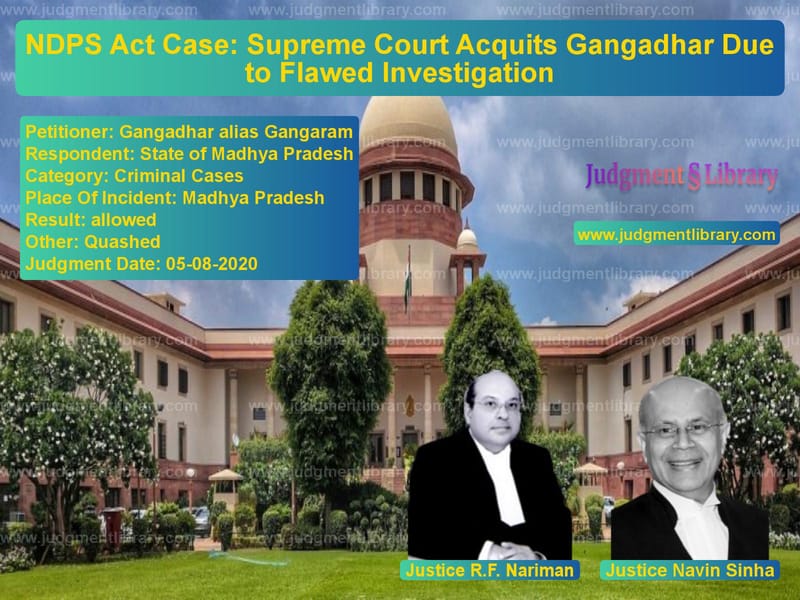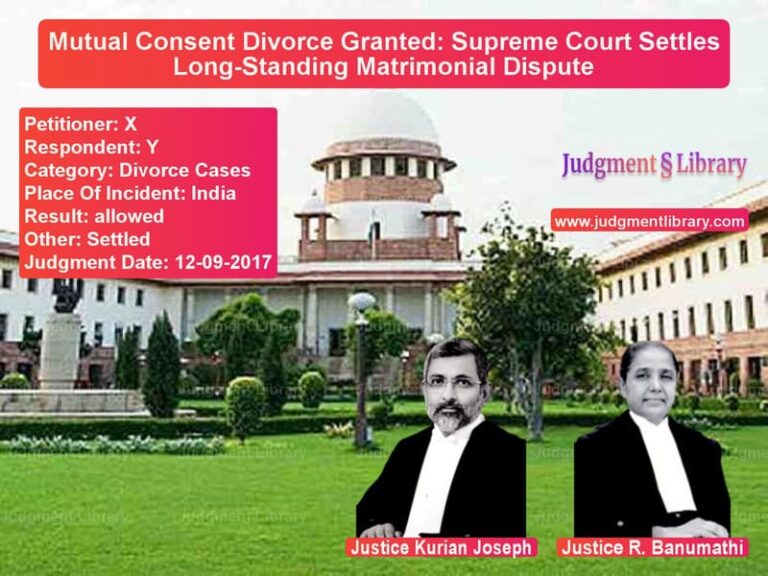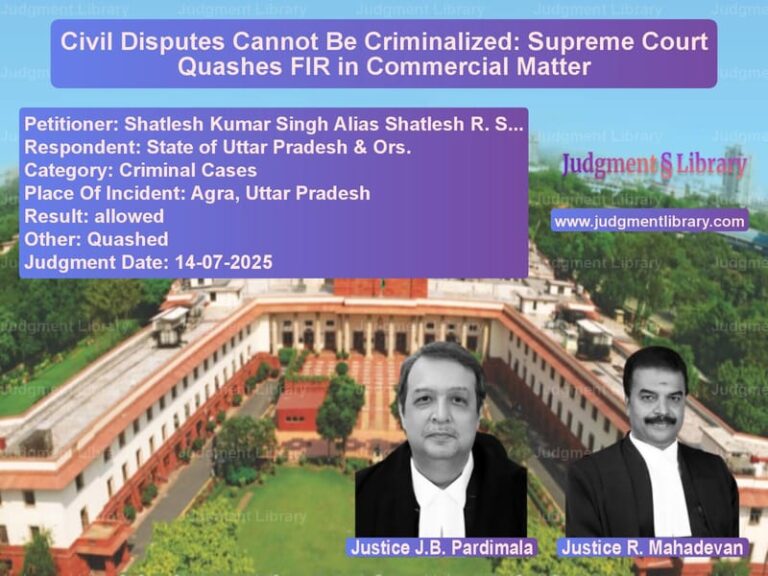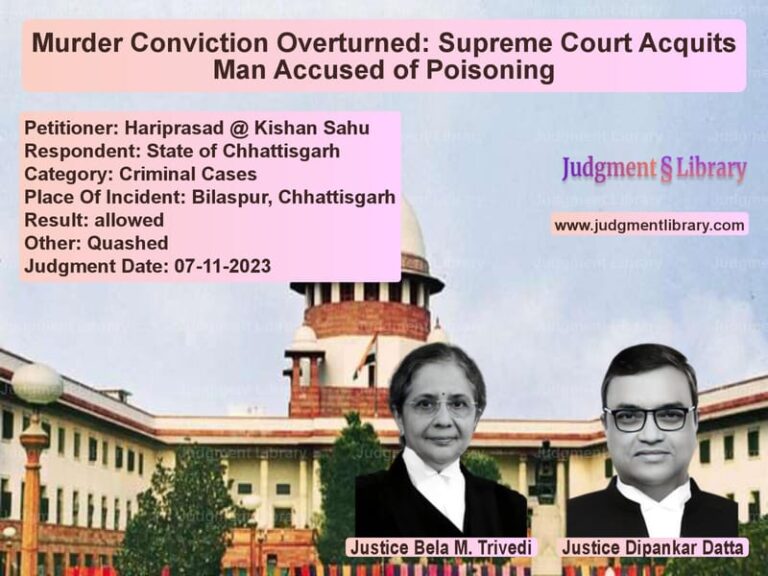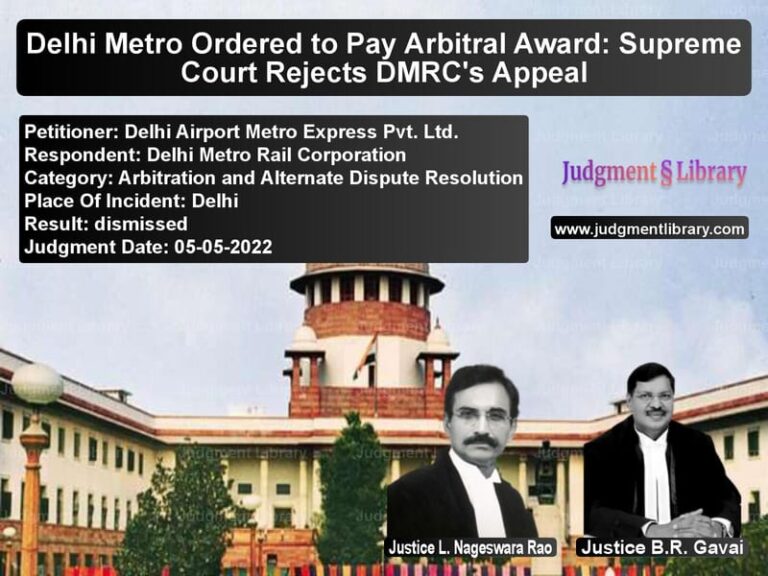NDPS Act Case: Supreme Court Acquits Gangadhar Due to Flawed Investigation
The case of Gangadhar alias Gangaram vs. State of Madhya Pradesh was a significant legal battle under the Narcotic Drugs and Psychotropic Substances (NDPS) Act, 1985. The Supreme Court’s ruling highlighted crucial concerns regarding flawed investigation, lack of evidence, and violation of the right to a fair trial. The accused, Gangadhar, was sentenced to 10 years of rigorous imprisonment for allegedly possessing 48 kg and 200 g of cannabis (ganja). However, the Supreme Court ultimately acquitted him.
Background of the Case
The case began when the police raided a house in Madhya Pradesh and recovered a large quantity of ganja. Gangadhar was identified as the owner of the house based on the voters’ list of 2008, even though he claimed he had sold the house to another accused, Gokul Dangi, on 12.06.2009.
Gokul Dangi was initially the primary suspect, and the police had received secret information that he had stored contraband in his house. However, during the investigation, the police also implicated Gangadhar.
Arguments by the Petitioner (Gangadhar)
- The conviction was based on the mere assumption that he owned the house, without any proof of conscious possession of the drugs.
- He had sold the house before the alleged incident, as evidenced by a sale agreement dated 12.06.2009.
- The police never investigated the sale agreement, nor did they verify records of the village panchayat to confirm the ownership change.
- There was no reason why he would take the police to his own former house and have the lock broken, thereby implicating himself.
- The investigation was incomplete, and the evidence was unreliable.
Arguments by the Respondent (State of Madhya Pradesh)
- Gangadhar was listed as the owner of the house in the 2008 voters’ list, which was sufficient proof of ownership.
- The sale agreement was fabricated, as one of the alleged witnesses denied placing his thumb impression on it.
- The police believed Gangadhar was using the house as a storage facility for the contraband, even though he did not reside there.
Supreme Court’s Observations
The Supreme Court noted several crucial flaws in the investigation and prosecution:
- The presumption of ownership was based on an outdated document (voters’ list of 2008) and was not supported by further inquiry.
- The police never investigated the sale agreement presented by Gangadhar the very next day after his arrest.
- Despite having access to official village panchayat records, which are public documents, the police failed to verify the ownership.
- Ghasiram, the village chowkidar, was the best witness to confirm ownership of the house, yet the prosecution failed to examine him.
- The presumptive burden under Sections 35 and 54 of the NDPS Act was misapplied.
- Gangadhar had been living in another house for 15 years, and there was no evidence that he had access to or control over the raided house.
Key Legal Findings
The Supreme Court reaffirmed the principle that:
- The burden of proof is on the prosecution to prove guilt beyond a reasonable doubt.
- Under the NDPS Act, even though there is a presumption against the accused, it is a rebuttable presumption, and the prosecution must still establish a prima facie case.
- The stringent provisions of the NDPS Act do not allow for convictions based on preponderance of probability; they require clear, conclusive evidence.
- Failure to conduct a fair and proper investigation violates the accused’s fundamental right to a fair trial under Article 21 of the Indian Constitution.
Final Judgment and Implications
The Supreme Court held that the prosecution had failed to establish conscious possession of the contraband. The investigation was poorly conducted, and the conviction was based on assumptions rather than evidence.
In its concluding remarks, the Court stated:
“Gross misappreciation of evidence by two courts, let alone poor investigation by the police, has resulted in the appellant having to suffer incarceration for an offense he had never committed.”
The Court acquitted Gangadhar and ordered his immediate release.
This ruling serves as a strong reminder that legal presumptions cannot replace actual evidence and that every accused person is entitled to a fair investigation and trial.
Petitioner Name: Gangadhar alias Gangaram.Respondent Name: State of Madhya Pradesh.Judgment By: Justice R.F. Nariman, Justice Navin Sinha.Place Of Incident: Madhya Pradesh.Judgment Date: 05-08-2020.
Don’t miss out on the full details! Download the complete judgment in PDF format below and gain valuable insights instantly!
Download Judgment: Gangadhar alias Gang vs State of Madhya Prad Supreme Court of India Judgment Dated 05-08-2020.pdf
Direct Downlaod Judgment: Direct downlaod this Judgment
See all petitions in Drug Possession Cases
See all petitions in Bail and Anticipatory Bail
See all petitions in Custodial Deaths and Police Misconduct
See all petitions in Judgment by Rohinton Fali Nariman
See all petitions in Judgment by Navin Sinha
See all petitions in allowed
See all petitions in Quashed
See all petitions in supreme court of India judgments August 2020
See all petitions in 2020 judgments
See all posts in Criminal Cases Category
See all allowed petitions in Criminal Cases Category
See all Dismissed petitions in Criminal Cases Category
See all partially allowed petitions in Criminal Cases Category

